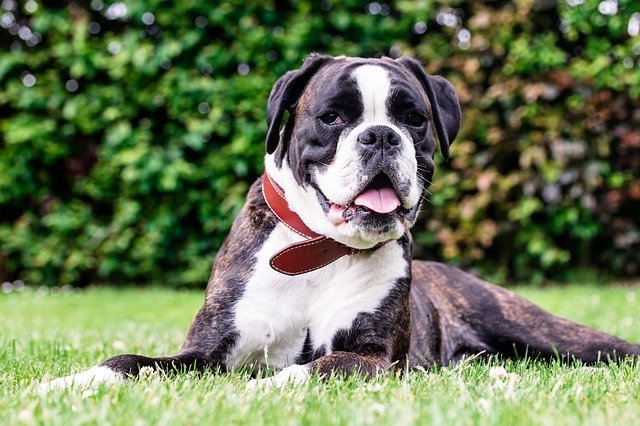Boxers make great family pets, but are Boxers good with kids? Yes, they are!
These intelligent dogs may be big, but they are patient, playful, and affectionate companions.
However, there are some things you should know before bringing home your new boxer!
The Big Picture
The boxer may look tough, but with consistent training, and good socialization, this energetic but patient pup is the perfect playmate, confidante, and watchdog, for any family member.
The Good
The boxer has many great qualities that make them good with kids, including
- Patience
- Playfulness
- Protectiveness
- Robustness
Playfulness
Boxers are high-energy goofballs that enjoy an active play session! This characteristic can be perfect for younger children who have the energy to spare but parents who do not.
A well-trained boxer will keep a child busy for hours with a game of Frisbee at the park or tag in the fenced-in yard!
Patience
Not all dogs are patient, but boxers can be when they receive proper training and adequate exercise! Small dogs can be easily frustrated with young children.
The boxer, however, is more easygoing and accommodating of young human siblings.
Interestingly, the boxer consistently ranks as one of the top five “nanny dog” breeds!
Protectiveness
Even though the boxer can be soft with their family, they can also be fiercely protective should the need arise.
Ever watchful, this dog has a long history of guard dog work and has the muscle to back up the protective instinct if needed.
In addition to being named one of the top nanny dog breeds, the boxer is also recognized as one of the best guardian breeds!
Robustness
Another characteristic that makes the boxer great for life with children is that they are a robust breed.
Unlike smaller dogs that can often get injured by children who are unsteady on their feet, the boxer is large enough to roughhouse with children without getting hurt in the process!
The Not So Good
The boxer can also have some more challenging traits that can be problematic without training and consistency.
- Stubbornness
- Lack of awareness of their size
- Energy
- Barking
Stubbornness
One frustrating characteristic that can be difficult for new boxer families is their stubborn nature.
Without the right motivation and reinforced training, the boxer can be headstrong, but with plenty of exercises and a trusting relationship, your pup will be much less likely to dig in their heels.
Lack of Awareness of Their Size
Another concern that parents of small children should be aware of is that boxers don’t often realize their size.
This lack of self-awareness can pose problems when playing with younger human siblings by increasing the chances of children getting knocked over.
A professional animal behaviorist and trainer can help to address behavioral issues and change undesirable behavioral patterns.
Energy
Having an energetic dog can be a great thing if you have children that never seem to drop, but if you are a more sedentary, quiet household, all that boxer energy needs somewhere to go!
Without a healthy outlet, an under-exercised boxer can cause chaos and destruction for everyone in the family!
Barking
Boxers are barkers. The boxer is a breed developed for hunting and guarding activities – both tasks that require vocalization.
Despite domestication, your boxer likely still has a natural talent for barking, which can be troublesome if you have children.
Barking can startle younger children and wake up a sleeping baby in a heartbeat!
The Importance of Training
One of the most important things you can do for your boxer is to dedicate yourself to their training.
Take multiple obedience classes (for example, basic and advanced obedience) and practice obedience commands often.
In addition to practicing commands at home, be consistent with the obedience commands that you use!
Also, make sure that everyone in the house uses the same set of obedience commands and that your dog follows through with what you asked them to do.
Training helps to improve communication between your family and your dog, but it also helps your dog to establish a blueprint by which to structure future interactions.
The Importance of Exercise and Mental Stimulation
Like all dogs, the boxer needs regular exercise and mental stimulation and without these things, they can become frustrated and even destructive.
A boxer without an outlet for their energy is like a firework that someone lights indoors.
Trying to get that firework under control and redirect that energy without any destruction is an incredible challenge!
Raising Children and Dogs
There are two key points to know when raising children and dogs –
NEVER leave your children alone with dogs, even if your dogs are well trained.
Even the best-behaved dog can snap if a child accidentally falls on them while they are sleeping, and even the best-behaved child can accidentally fall.
ALWAYS teach your children the importance of respecting animals.
As a parent and dog owner, it is your responsibility to teach your children how to respect animals and show your pets how to respect children.
Do not bring any animals into your home if you feel that your child cannot treat them with respect.
If you think that your animal cannot respect children, do not put them in a situation where they must interact.
Conclusion / Summary
So, are Boxers Good With Kids? Yes! With consistent training, regular exercise, and happy home, the boxer is a great addition to any family!


